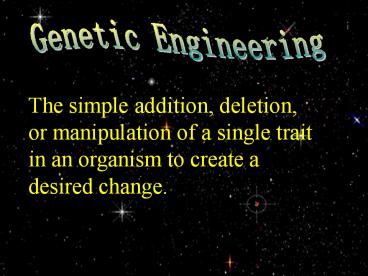Genetic Engineering PowerPoint PPT Presentation
Title: Genetic Engineering
1
Genetic Engineering
The simple addition, deletion, or manipulation of
a single trait in an organism to create a desired
change.
2
Genetic Engineering
Genetic Engineering
-major tool is recombinant DNA. -Recombinant- DNA
joined to other unrelated foreign DNA. -also
called gene splicing. -tiny segments of a gene
are taken out and replaced.
3
Transgenic Organisms
Organisms altered by genetic engineering. -genetic
material changed by other than random natural
breeding. -gene transfer-moving a gene from one
organism to another. -these require skill and
knowledge to be carried out properly
4
Transgenic Organisms
-GMO- genetically modified organism. -GMO free
food-product in which no transgenic materials
were used in its manufacture, such as soybeans
used in making oils. -GEO-genetically enhanced
organism
5
Genetic Engineering
-genetic material can be shared across scientific
kingdoms. -bacteria engineered-produce human
proteins -potential is virtually endless.
6
Agriculture
-food processors affected by genetic
engineering. -shelf-life, storage,
food-handlingextended and simplified. -help
resist spoilage.
7
Agriculture
-plants transformed-insect,disease, and herbicide
resistant.-animals treated engineered
hormones-produce more milk, leaner meat.
8
Health and Medicine
-affecting health care medical
industry.-alternating growth w/hormones-
replacing organs are common.-materials maybe
rejected by organism unless hormones are offered.
9
Pharmaceutical Products
-Pharmacology-preparation, use, and affect of
drugs-tied to health and medicine-potential
production of drugs is great. -hormone
production-natural in endocrine system of
mammalian body.
10
Pharmaceutical Products
-bacteria engineered to produce
hormone.-fermentation known as bioprocessing.
11
Industry and Environment
-more efficient use of scarce minerals-greater
efficiency in mining.-major concern-waste
management.-biodegrade a number of waste
products-sewage and petroleum products.
12
Genetic Engineering
-gene splicing, gene cloning, molecular
cloning-process cutting a gene out of a DNA
strand and inserting the gene into another DNA
strand.
13
Endonucleases
-type of enzyme in DNA strand.-produced nucleic
acid strand breaks interior of nucleic acid
strand.-restriction endonucleases-enzyme
produced by bacteria that is used in recombinant
DNA.-cuts open bacterial plasmid.-gene
construct engineered to plasmid with ligasees.
Plasmids back to bacterium.
14
Cloning Vectors
-carrier for DNA during the recombinant DNA
process.-plasmid-piece of free-floating DNA in
the cytoplasm of bacteria.-double-stranded,
circular molecules that replicate independently
of the chromosome.
15
Cloning Vectors
- Promoter gene- A sequence of bases in a nucleic
acid strand, that serves as a signal to start
transcription. - Chromosomal DNA construct- The gene of interest.
- Antibiotic resistant gene- Are used as a marker
system for transformed cells.
16
Ligation and Conjugation
- Ligation- uniting attaching two DNA fragments.
- Recipient cell- is the cell that is reviewing the
new DNA. - Donor cell- is the cell that provides the new DNA
fragment for the recipient cell - Virto- done in glass
17
Transformation
- Transformation- process of introducing free DNA
into bacteria - Competent cell- a cell that is capable of taking
up DNA. - Electroporation- The use of an electric shock to
momentarily open or disrupt cell walls.
18
Transformation
- Conjugation- the contact of bacteria that
involves the exchange of DNA with a mating tube. - Transformed cell- cell with new DNA
- Marker gene- a gene that identifies which
organisms have been successfully transformed
19
Other Processes
- Totipotent- means that an organism has the
ability to grow from a single cell - -especially important with plants, also called
regeneration.
20
AgroBacterium Transformation
- Agro bacterium tumefacians is a bacterium that
causes a disease known as crown gall in plants. - Infects plants by transferring its genetic
material into plant cell. - Agrobacterium transformation is the most common
technique for genetically engineered plants
21
Ballistic Gene Transfer
- Ballistic Gene Transfer- the use of tiny
DNA-coated projectiles as carriers. It is
important to transport DNA through the walls of
intended recipient cells. - Projectiles are often known as micro projectiles
- Ballaistic transformation is done by using a
gene gun the gene gun has been useful in
creating agricultural crops.
Ballistic Gene Transfer- the use of tiny
DNA-coated projectiles as carriers. It is
important to transport DNA through the walls of
intended recipient cells. Projectiles are often
known as micro projectiles Ballaistic
transformation is done by using a gene gun the
gene gun has been useful in creating agricultural
crops.
22
The Role of Tissue Culture
- Callus- a mass of undifferentiated plant cells.
- By making a callus the number of transformed
cells is increased
23
Genetic Engineering of Animals
- Due to early cell differentiation, genetic
transformation in animals must occur in the early
embryo stage following the union of sex cells - This is accomplished by using microinjection, to
randomly inject DNA into the fertilized call - Microinjection- is the injection of materials
directly into cells using a small glass pipette.
24
Genetic Engineering of Animals
- The process of creating transgenetic animals
involves three major steps - Obtaining embryos
- Microinjectioing embryos
- Culturing and transferring zygotes
- Transgenetic integration- is expressed by the
animal of that desired trait.
25
THE END
- By Kay Jessica

